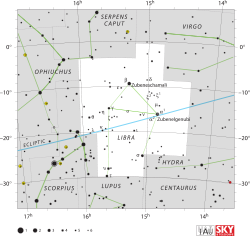Libra (constellation)
| Constellation | |

|
|
| Abbreviation | Lib |
|---|---|
| Genitive | Librae |
| Pronunciation | /ˈliːbrə/, genitive /ˈliːbraɪ/ |
| Symbolism | the balance |
| Right ascension | 15 |
| Declination | −15 |
| Family | Zodiac |
| Quadrant | SQ3 |
| Area | 538 sq. deg. (29th) |
| Main stars | 4, 6 |
|
Bayer/Flamsteed stars |
46 |
| Stars with planets | 3 |
| Stars brighter than 3.00m | 2 |
| Stars within 10.00 pc (32.62 ly) | 5 |
| Brightest star | Zubeneschamali (β Lib) (2.61m) |
| Nearest star |
Gliese 570 (19.20 ly, 5.89 pc) |
| Messier objects | 0 |
| Meteor showers | May Librids |
| Bordering constellations |
Serpens Caput Virgo Hydra Centaurus (corner) Lupus Scorpius Ophiuchus |
|
Visible at latitudes between +65° and −90°. Best visible at 21:00 (9 p.m.) during the month of June. |
|
Libra /ˈliːbrə/ is a constellation of the zodiac. Its name is Latin for weighing scales, and its symbol is ![]() (Unicode ♎). It is fairly faint, with no first magnitude stars, and lies between Virgo to the west and Scorpius to the east. Beta Librae, also known as Zubeneschamali, is the brightest star in the constellation. Three star systems have planets.
(Unicode ♎). It is fairly faint, with no first magnitude stars, and lies between Virgo to the west and Scorpius to the east. Beta Librae, also known as Zubeneschamali, is the brightest star in the constellation. Three star systems have planets.
Libra was known in Babylonian astronomy as MUL Zibanu (the "scales" or "balance"), or alternatively as the Claws of the Scorpion. The scales were held sacred to the sun god Shamash, who was also the patron of truth and justice. It was also seen as the Scorpion's Claws in ancient Greece. Since these times, Libra has been associated with law, fairness and civility. In Arabic zubānā means "scorpion's claws", and likely similarly in other Semitic languages: this resemblance of words may be why the Scorpion's claws became the Scales. It has also been suggested that the scales are an allusion to the fact that when the sun entered this part of the ecliptic at the autumnal equinox, the days and nights are equal. Libra's status as the location of the equinox earned the equinox the name "First Point of Libra", though this location ceased to coincide with the constellation in 730 because of the precession of the equinoxes.
...
Wikipedia
